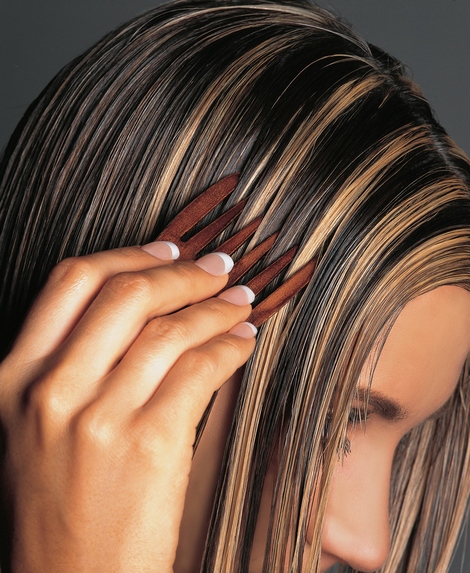How to Protect You Hair from Chemical Damage – Practical Advice for Women
For most women, hair represents their beauty and significantly contributes to their personal style and self-image. However, the delicate mechanisms that rule hair growth and produce healthy-looking, luxurious locks can easily get out of tune in response to many events in a woman’s life. Yo-yo dieting, vegetarianism, or just inadequate nutrition; pregnancies or age-related hormonal transitions; high levels of physical or emotional stress so typical for modern lifestyles; certain illnesses, such as celiac disease or a low thyroid function; taking birth-control pills, steroids, or other medications; or even too much of hair grooming, shampooing, and styling can interfere with the health of hair and disrupt the natural cycles of hair growth. As a result, the woman’s hair can become brittle and damaged, can lose its thickness and glow, and start shedding or prematurely greying even at a young age.
The most obvious cause of female hair shedding is, ironically, the overindulgence in using commercial hair products that are so shamelessly and aggressively marketed by manufacturers at women of all ages. A rare woman will carefully study the list of ingredients of a prestigious, expensive hair conditioner or shampoo that is advertised as the most advanced, “must-have” formula every respectable woman should buy and use! But if she does study and research the ingredients, she will discover that most commercially-produced hair-care products feature unhealthy, petroleum-derived chemicals and other laboratory-brewed, synthetic ingredients that can be highly damaging for everybody’s hair and even general health.
A woman, who routinely uses a lot of commercial hair products, ranging from shampoos and conditioners to dyes and styling gels, puts her hair at a significant risk. Multiple salon procedures, such as hair waving, colouring, or straightening, add to the damage. Over time, this can contribute to hair loss and can also lead to the developing of frizzy, brittle, and weak hair.
Especially dangerous are synthetic hair dyes that many women repeatedly use to cover up the grey or just try on a new image. While changing hair colour can be fun and can also provide a temporary fix for greying hair, the chemicals used in commercial dyes are linked to long-term harmful health effects. Not everybody knows that ordinary hair colouring can result not only in burns, rashes, or frequent allergic reactions, but can also contribute to the development of some types of cancer.
According to the International Journal of Cancer, women who use commercial permanent dyes on a monthly basis, DOUBLE their risk of contracting cancer of the bladder! Particularly dangerous are darkening colours that contain the largest amount of toxic chemicals.
Is there an alternative to using unhealthy chemical cocktails that the “beauty industry” offers to women? Can we preserve the health of our hair and avoid hair loss yet still keep our hair clean, fragrant, and coloured, if we wish?
The best solution is to opt for natural, non-toxic choices – beneficial, plant-based shampoos, lotions and conditioners for everyday hair care; herbal rinses and nourishing massage oils to treat hair loss, dandruff and other hair and scalp problems; and natural hair dyes that can be either home-made or purchased from health stores, to mask greying hair or just play with different hair shades. Compared to synthetic colouring agents found in supermarket or even drugstore products, non-toxic hair dyes usually feature pigment-containing plants or herbs, such as henna, beetroot, walnut, coffee, or indigo. They are also enriched with other health-boosting ingredients, such as hydrolyzed wheat protein, jojoba, and essential aromatic oils of different herbs. Natural hair dyes also use much less hydrogen peroxide – the ingredient that helps the colour penetrate the hair shaft.
If you do use commercial colours, make sure that they do not touch your skin, through which they can easily appear in your bloodstream – opt for the benefits of foil or a cap to protect your skin and scalp from irritating chemicals. Also, remember that it is always less damaging to lighten your hair than to darken it, since hair-lighteners usually contain fewer toxic ingredients.
However, my advice is that you should always choose simple, effective, and beneficial herbal products for personal hair care. Get the look you want – without jeopardizing the health of your hair or putting yourself at unnecessary risks for developing allergies, autoimmune disorders, or cancer!
Christiana Roberts
Posted on May 20, 2008
Filed Under Hair Care, Hair Loss Reasons
Comments
One Response to “How to Protect You Hair from Chemical Damage – Practical Advice for Women”
Leave a Reply

Are there any hair loss products recommended for hair that has been damaged by chemically treatments?